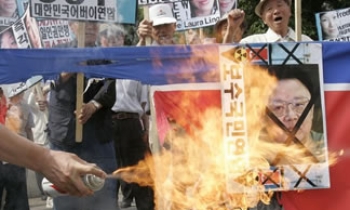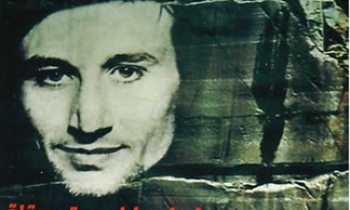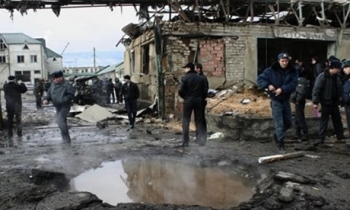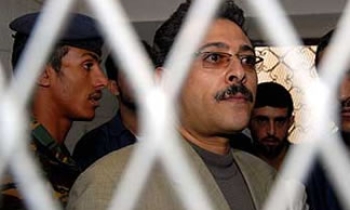Security police Thursday raided Belarussian broadcasters' offices and detained at least two reporters at their homes, Reuters has reported. The raids were launched two days after police broke up a rally by opponents of President Alexander Lukashenko and dozens of activists were fined or handed short jail terms.
Zhanna Litvina, head of Belarus's Journalists' Association, told Reuters that the KGB security service had searched offices of two independent radio stations, Polish-funded Radio Racja (Right) and EU-backed European Radio. A journalist at television broadcaster Belsat said its premises had also been raided.
A spokesman for Radio Racja said two reporters had been detained in Thursday's action. "KGB officers lay in ambush at apartments housing our reporters or offices and held anyone arriving there," he said. The KGB was unavailable for comment.
"The searches started in offices and apartments at almost exactly the same time in Minsk, Gomel, Grodno and other cities," Litvina said. "They say the formal grounds for this is a criminal case on insulting the president. We have no detailed information, as we cannot at the moment reach most of the journalists."
Accused by the West of human rights violations, Lukashenko has called for better relations in recent months, particularly with the European Union. But he, the Reuters report mentioned, remains locked in a diplomatic row with the United States, which this month withdrew its ambassador at Belarus's request in a dispute over US sanctions against Belarussian energy firm Belneftekhim.
Early Thursday morning, the KGB, the state security agency, raided the homes of journalists Eduard Mielnikau in Minsk, Anatol Hatochyts in Homiel, Alena Stsiapanava in Vitsiebsk, Tamara Shchapiotkina in Biaroza and Hienadz Sudnik in Mahileu. The government accuses them of libelling Lukashenka in cartoons during the public initiative “Third Way” in 2005. Agents seized computers and other materials. They also tried to search the home of journalist Vadzim Barshcheusky in Vitsiebsk, who didn’t open the door.
The offices of Radio Racyja were searched and reporter Yuliya Kotskaya was arrested and held for interrogation. Mobile phone connections of journalists cooperating with rhe European Radio for Belarus were cut Thursday morning.
"Earlier this week, journalists were beaten and put in jail simply because they were doing their job,” said International Federation of Journalists (IFJ) General Secretary Aidan White. ”Today the government has followed this up by sending security agents to journalists’ homes. We are worried by these developments which show that the situation of journalists in Belarus is going from bad to worse.”
On Tuesday, during demonstrations taking place to mark the 90th anniversary of the Belarusian People’s Republic, Nasha Niva photographer Andrei Lyankevich was brutally beaten by riot policemen. Together with dozens of other detained Belarusians he spent a night in jail and now faces trial. The court will decide if the journalist was on the staff of a registered newspaper and indeed performed a newsgathering role. Another Nasha Niva correspondent, Siamion Piechanko was sentenced to 15 days of detention under Belarusian administrative law. Both journalists are accused of “violating the order of arrangement and holding mass events” (articles 23, 24 of Belarus’ Code on Administrative Torts).
According to Nasha Niva Editor-in-Chief Andrei Skurko, the journalists had press cards and professional journalist equipment with them, though it was broken during riots. Skurko presented editorial assignments given to the detained journalists to show that the two journalists were on duty.
On Wednesday, a TV crew from Lithuanian RTL TV was also arrested and briefly detained at the Central City District Police Station in Minsk. The police seized a videotape made by RTL journalist Ruta Rybacheuskene and her cameraman.
IFJ says that in recent years Belarus has been violating every basic principle of press freedom, despite international calls to President Lukashenka to respect freedom of expression and human rights. He has recently concluded an agreement with British PR company Bell Pottinger Group to “work on his image.” “The best way President Lukashenka can improve his image is to respect press freedom and the work of journalists,” White said.
All the broadcasters have tiny audiences in the country of 10 million where state media are subject to tight control. The small liberal and nationalist opposition said the raids and police action could quash efforts to improve foreign relations.









